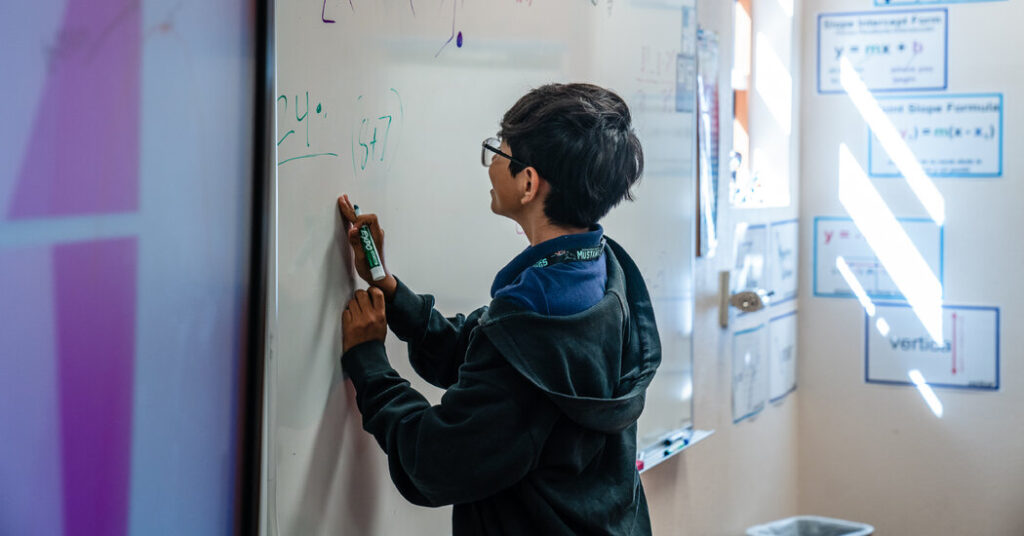Have you ever attended a school or program where students were grouped by ability level? If so, do you think it was beneficial to your learning and education? How so?
What issues can you think of that might arise when students are grouped by ability level? Have you experienced any of the drawbacks?
This is an issue school districts across the country are wrestling with. In “Why America’s Debate Over Which Children Are ‘Gifted’ Won’t Go Away,” Troy Closson writes about the challenges of identifying and educating some students as “gifted”:
In New York City, families sparred over whether a few thousand 4-year-olds should be funneled into gifted education programs.
In Seattle, teachers disagreed on how to improve the dismal enrollment rates of Black and Latino students in schools for gifted pupils, a problem decades in the making.
And in Fairfax County, Va., school leaders wrestled with a thorny question: Should we still label children “gifted”?
Welcome to America’s gifted and talented debate. From major cities to suburban districts, the question of how to identify and educate advanced students has emerged in recent years as one of the most volatile issues in public education.
In classrooms across the United States, some children display high-level skills from an early age: first graders who breeze through “Charlotte’s Web,” or 10-year-olds who can tell their friends how to find the circumference of a circle.
More than three million U.S. public school students are estimated to be enrolled in gifted programs. But those programs are a lightning rod, because the divide between who gets in and who is left out often falls along lines of race, income and disability status.
Imagine two students: one from an especially affluent household and another whose family lives well below the poverty line. Both perform at the same level in their core classes. Yet the child from the affluent family will be twice as likely to receive gifted services, research shows.
That divergence has generated federal civil rights complaints accusing big districts such as Los Angeles of failing to provide all children with an equal education.
And it prompts questions about ability and opportunity. Is bias shutting bright children out of gifted education? Are schools measuring academic potential or family privilege? Is a separate gifted and talented program even the best answer?
“There is no issue in American education that is more fraught,” said Thomas Toch, the director of FutureEd, an education think tank at Georgetown University, who called the enrollment disparities a troubling example of “the failure of public education to educate all students to their ability.”
Students, read the entire article and then tell us:
-
What is your reaction to the article? What do you see as some of the biggest problems with identifying and educating some students as “gifted”? What are some of the benefits of doing so?
-
Have you ever been part of a gifted and talented or other advanced education program? If so, how would you describe your experience?
-
How much of a role do you think ability plays in education? How much of a role does opportunity play? For example, the article gives an example of a fifth grader in a small Arizona school district who did not score well on a gifted test. The head of the early college program asked him to join anyway, and, years later, the student completed a biomedical engineering degree at an Ivy League university. What does this example say about ability and opportunity? Can you think of an experience from your own life when either ability or opportunity were more important to your learning?
-
How should schools educate advanced students? The article shares some of the many different approaches, including creating separate accelerated programs for those who have been identified as “gifted,” grouping students by ability within the same classroom or offering in-depth instruction for children who share common interests in areas such as robotics or design. Which of these approaches do you think is best? Have you seen or experienced something else that works well?
-
Do you believe we should still label children as “gifted” at all? According to the article, some districts worry that the term is outdated, rife with stereotypes and a false signal that some pupils naturally thrive on innate talent. What do you think?
-
The author writes that gifted and talented education is sometimes regarded as a “niche concern” since it affects relatively few students. Do you agree? What do you think are the most urgent issues in education right now?
Students 13 and older in the United States and Britain, and 16 and older elsewhere, are invited to comment. All comments are moderated by the Learning Network staff, but please keep in mind that once your comment is accepted, it will be made public and may appear in print.
Find more Student Opinion questions here. Teachers, check out this guide to learn how you can incorporate these prompts into your classroom.
Natalie Proulx is an editor at The Learning Network, a Times free teaching resource.
The post Should We Still Label Children as ‘Gifted’? appeared first on New York Times.




